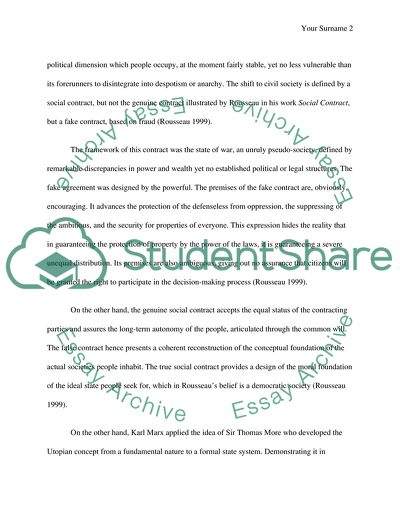
- Home
- Free Samples
- Premium Essays
- Editing Services
- Extra Tools
- Essay Writing Help
- About Us
- Studentshare
- Subjects
- Miscellaneous
- Western Civilization III
Western Civilization III - Essay Example

- Subject: Miscellaneous
- Type: Essay
- Level: Masters
- Pages: 4 (1000 words)
- Downloads: 0
- Author: keyonebert
Extract of sample "Western Civilization III"
o Herbert Spencer, the state had not yet existed in the remote past, and humanity anticipated a blessed situation where in the state would have died down, a possibility in the prediction of which Karl Marx shared (Vincent 2004). The objective of this paper is to discuss the concept of the ideal state as claimed by two of the leading political theorists, Jean Jacques Rousseau and Karl Marx. In Rousseau’s point of view, the ideal type is the state of nature, which he develops falsely by theorizing from every social component, specifically from the various ways in which human beings have existed in structured relations, however negligible the structure or order, however short-lived the relations.
Rousseau claimed that the invested civil society, or the political dimension which people occupy, at the moment fairly stable, yet no less vulnerable than its forerunners to disintegrate into despotism or anarchy. The shift to civil society is defined by a social contract, but not the genuine contract illustrated by Rousseau in his work Social Contract, but a fake contract, based on fraud (Rousseau 1999). The framework of this contract was the state of war, an unruly pseudo-society, defined by remarkable discrepancies in power and wealth yet no established political or legal structures.
The fake agreement was designed by the powerful. The premises of the fake contract are, obviously, encouraging. It advances the protection of the defenseless from oppression, the suppressing of the ambitious, and the security for properties of everyone. This expression hides the reality that in guaranteeing the protection of property by the power of the laws, it is guaranteeing a severe unequal distribution. Its premises are also ambiguous, giving out no assurance that citizens will be granted the right to participate in the decision-making process (Rousseau 1999).
On the other hand, the genuine social contract accepts the equal status of the contracting parties and assures the long-term
...Download file to see next pages Read MoreCHECK THESE SAMPLES OF Western Civilization III
Mesopotamia Civilization
Wester Civilization II paper #4
A critical book review 5 to 8 page paper (approximately 250 words per page)
Islam & clash of civilizations
Western Heritage I
Westen Civilization
World History of the 18-19th century
Eastern European Backwardness

- TERMS & CONDITIONS
- PRIVACY POLICY
- COOKIES POLICY